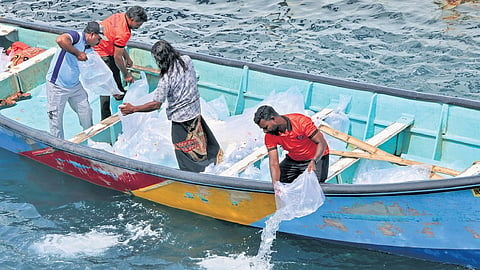

THIRUVANANTHAPURAM: In an effort to replenish natural fish stock, 20,000 seeds of pompano fish were released into the sea off the Vizhinjam coast on Wednesday as part of the ‘Sea Ranching at Artificial Reefs’ initiative of the central (Pradhan Mantri Matsya Sambada Yojana) and state governments to improve fish availability and promote the welfare of traditional fishermen.
Speaking at the inaugural ceremony of the marine fish seed deposition at Vizhinjam North Harbour, Union Minister of State for Fisheries George Kurian said that the new project aims to improve fishing and enhancing livelihoods for the state’s coastal communities.
Minister for Fisheries Saji Cherian presided over the function.As part of the project’s first phase, 6,300 artificial reefs have been deployed across 33 sites of the total 42 locations in the sea of Thiruvananthapuram district.“Artificial reefs are concrete modules in the shape of triangles, pipes or flowers in which flora and fauna are grown to increase the availability of the fishes.
Once the fish seeds are deposited, it will be monitored with underwater cameras and an impact study will be carried out,” said Smitha R Nair, additional director, Fisheries Department.
Stakeholders (fishermen), coast guard and Kerala State Coastal Area Development Corporation Ltd. (KSCADC) were involved in the sea ranching.
With a budget allocation of Rs 13.02 crore, the project has received funding from both the central and state governments in a 60:40 ratio.
These reefs are intended to provide a sustainable fishing environment by creating habitats that support fish breeding and increase fish stock. To boost the fish population in these artificial reefs, the Union government has sanctioned an additional `3 crore through the National Fisheries Development Board (NFDB) for the ‘Sea Ranching’ project.
This involves the systematic release of fish seeds, including pompano and cobia, to increase fish stocks within the artificial reef areas. In this phase, 10 lakh fish seeds will be introduced across 10 reef sites at the rate of one lakh per reef. These fish seeds consist of juvenile fish weighing between 8 and 10g, which will be deposited at regular intervals to ensure optimal growth and survival rates.